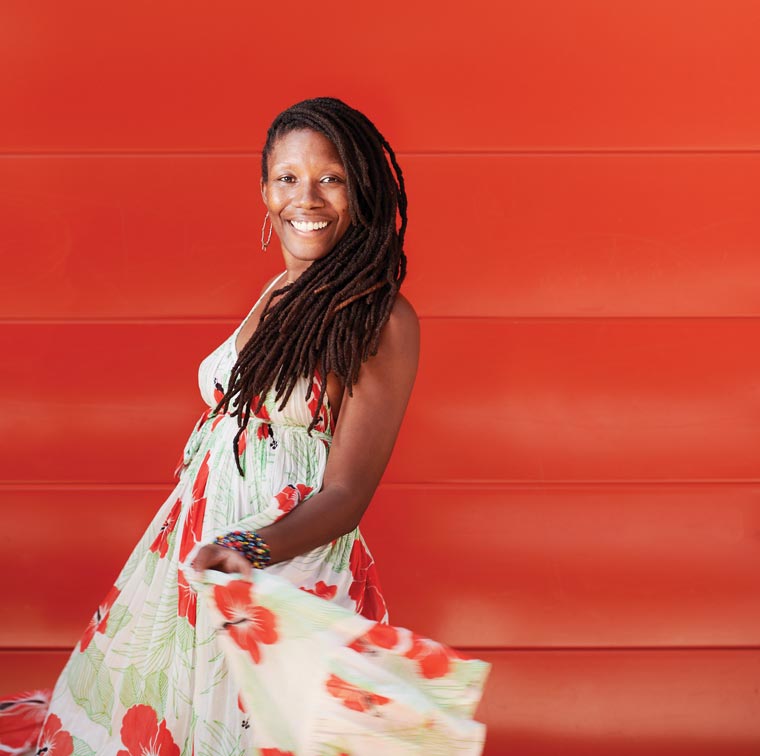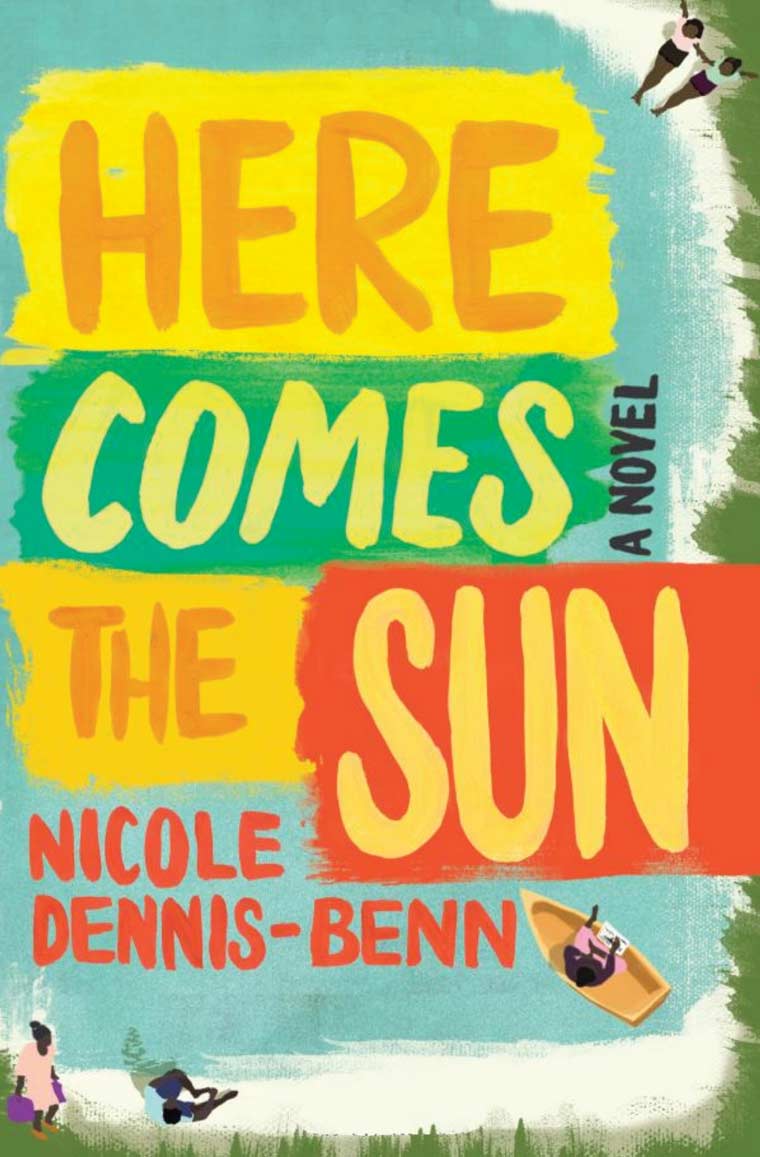In the musical rhythm of patois, a Kingston-born author pens the untold stories of unseen women.

When Nicole Dennis-Benn MFA ’12 moved from Jamaica to the United States to live with her father and start college, she began writing poetry to alleviate her homesickness. She switched to prose as a pre-med student at Cornell University and continued writing as she earned her master’s degree in public health at the University of Michigan, Ann Arbor. Later, as an HIV project coordinator at Columbia University, she still stayed up late nights to write.
Her girlfriend (whom she has since married) noticed the evening ritual. “Are you sure about public health?” Benn asked. “Have you ever thought of being a writer?”
Until that moment, Dennis-Benn had not. To her, achieving the American dream meant going into a field that assured stability. Yet writing called to her, and soon she was applying to MFA programs in fiction. “Once the applications were in,” says Dennis-Benn, “there was no looking back.”
By the time she enrolled, she says, the pressure to succeed kept her afloat. “I’d think: I have to work really hard or what else am I going to fall back on?” Dennis-Benn did work hard—very hard. “Sarah Lawrence taught me discipline,” she says. “I encountered individuals who really pushed me to be my best.”
That dedication paid off. In 2010, a trip to Jamaica planted the seeds for what would become her critically acclaimed debut novel, Here Comes the Sun. The book explores dynamics of race, class, and sexuality through the narratives of four women living in her homeland, struggling to find their way out of poverty.
“I went back as a tourist with my wife and saw people I grew up with who have been socialized to be ambassadors and sell this fantasy of paradise,” she says. “I left Jamaica for a reason. I grew up in a working-class family—upward mobility wasn’t easy.”
Working on her novel was healing. “Writing this story helped me open my eyes and understand things I hadn’t understood before,” she explains, “including the previous generation, many of whom have upheld the colonial mindset.”
“I encountered individuals who really pushed me to be my best.”
Upon its publication in 2016, Here Comes the Sun was named a Notable Book of the Year by The New York Times and a Best Book of the Year by Kirkus Reviews, Amazon, NPR, BuzzFeed, The Root, Book Riot, and Barnes & Noble. It was also lauded by BBC, Bookish, The Miami Herald, Elle, O Magazine, Marie Claire, Flavorwire, After Ellen, BookPage, Cosmopolitan, and Brooklyn Magazine, among others.
For Dennis-Benn, the book’s success was not completely unexpected. “I paid my dues and kept all my rejection letters, to use them as fuel,” she notes. “That said, it was still definitely a relief.”
What did come as a surprise was discovering that the specific themes of displacement and home, love and loss, and race and class struck a universal chord. “I love hearing that even people who are not Jamaican feel that this is their story, too,” she says.
Web Extra
Finding New Perspective
Nicole Dennis-Benn MFA ’12 ended her self-imposed exile from Jamaica in 2010—a visit prompted by a question from her wife, with whom she was then living in Brooklyn: “Why is it you never talk about your background?”
Dennis-Benn’s detachment was complicated. After coming out to her parents in 2006, she felt unwelcome. She was also highly aware of colonialism’s indelible mark upon the island, and, in turn, its mark on her life. Though Jamaica became independent in 1962, deeply engrained beliefs from centuries as a British colony remained. “My parents’ generation upheld a lot of that colonial mindset—the uniformity, the respectability,” she says. “In my 20s, I resented that a lot.”
Returning to her birthplace more than a decade after leaving for college, Dennis-Benn began to reconcile different facets of her upbringing and identity. The homecoming helped her make important connections between colonialism, class, race, gender, and sexuality—a perspective that would ultimately lead to her debut novel.
“It wasn’t until bringing [my wife] back to Jamaica that everything I’d been running away from up until that point came back,” Dennis-Benn observed in a 2017 Time Out interview.
The trip gave her an invaluable window into her parents’ generation. “There is a forceful expectation to present oneself in the best light possible, and this expectation really crushes a lot of the youth, especially those who are lesbian, gay, or non-gender conforming,” Dennis-Benn says.
In addition to this newfound understanding, the stellar reception that greeted Here Comes the Sun also gave Dennis-Benn recognition and a platform from which she could give voice to experiences not previously seen or valued. For her second book-length project, PATSY (publishing next June), Dennis-Benn is tackling identity and marginalization from a different vantage. Set in Brooklyn, the novel depicts the day-to-day hustle of an undocumented immigrant who abandoned her young daughter in Jamaica in search of her own freedom.
As immigration issues receive increased media attention, more Americans are becoming aware of the difficulties of the immigrant experience. Yet, as an immigrant, Dennis-Benn has always been aware of the precarious issue of citizenship—who gets access and who doesn’t.
For a lot of immigrants, she says, “there’s a sense of existing here, but not really existing, like an invisible person moving through from day to day,” she explains. “I wanted to capture what that feels like for the undocumented [in my second project].”
The success of Here Comes the Sun has only strengthened Dennis-Benn’s determination to bring Jamaican women out of the shadows. “As products of the colonial mindset, we were taught to respect shame and silence more than our own voices,” she says. “Now, more women have a voice, and those are the discussions we need to have.”
Written by Suzanne Guillette MFA ’05
Photos by Laura Barisonzi

Dennis-Benn’s first novel expores dynamics of race, class, and sexuality. Her second novel, PATSY, will be released in June 2019, and she’s recently started research for her third book. This fall, she joined the writing faculty at Princeton University.